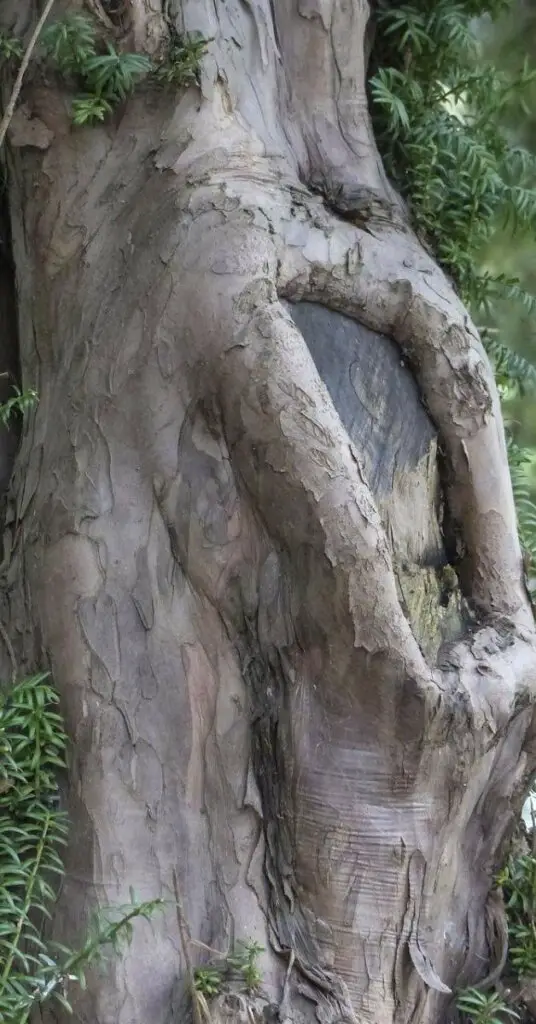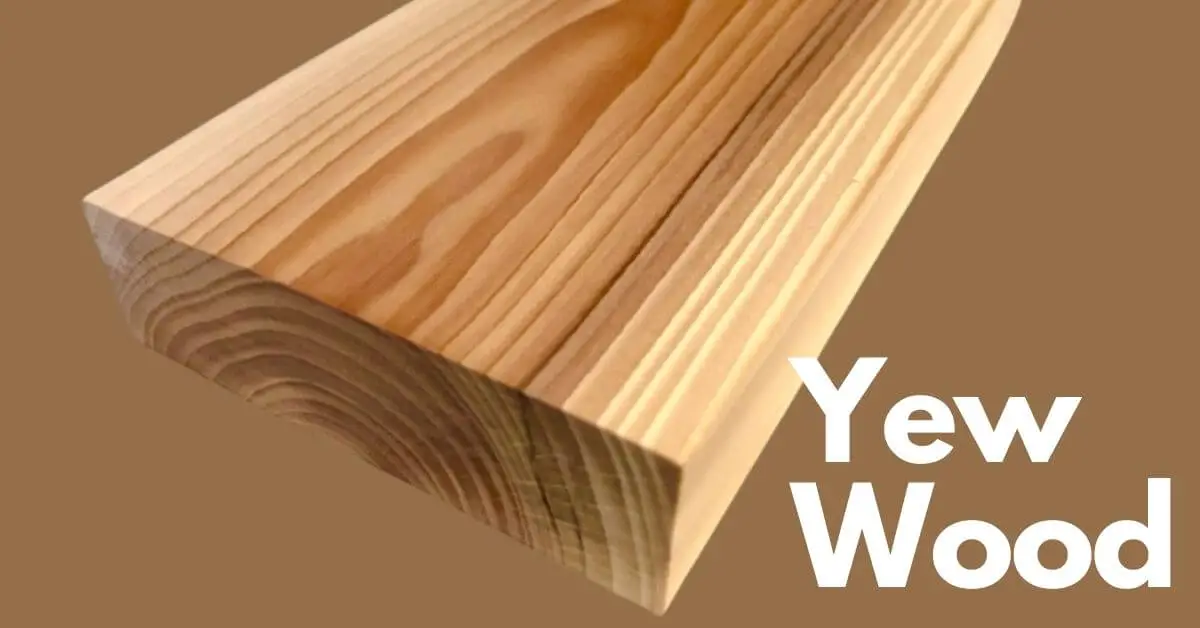What is Yew Wood?
Yew is very durable, stable, and moderate rot-resistant softwood. It is used to make veneers, cabinetry, furniture, and musical instruments.
Yew (Taxus) is a softwood, but it is harder than many hardwoods. It is heavy due to its high density.
It is cultivated as an ornamental tree, native to western, central, and southern Europe, northwest Africa, northern Iran, and southwest Asia.
| # | English Yew |
| Scientific name | Taxus |
| Tree Height | 30-65 ft (10-20 m) tall, 3-5 ft (1-1.5 m) trunk diameter |
| Rot-resistant | Very Rot-resistant |
| Workability | Generally, easy wood to work |
| Wood Type | Softwood |
| Common Uses | Bows, plywood, furniture, cabinetry, musical instruments (lutes), and objects. |
Yew Wood Uses
Yew is one of the most popular woods for making bows. It has good tensile strength and good compression. It is a very strong and flexible wood. You can easily bend it into a shape.
Yew is hard softwood. It is a great choice for cabinetry and indoor and outdoor furniture.
Its straight grains allow tools to carve easily. It is used to make small decorative items and other objects. Yew wood has elastic properties. So it is ideal for turning and carving.
Yew is used to making quality veneer and plywood. Yew plywood is a versatile material, used in almost all wood projects.
Pacific Yew can be a good selection for making musical instruments mostly lutes.
Identification
Heartwood is an orangish-brown with a darker brown or purplish hue, while sapwood is a pale yellow or tan color.
Usually, Yew wood has a straight grain, with a fine texture. The wood has dark and light brown streaks.
Like many other woods, the Yew color tends to darken with age. This process happens quickly when exposed to UV rays.
Is Yew Wood Hard or Soft?
Yew is a hard softwood, which means Yew wood is categorized as softwood, but it is hard. The softness or hardness of the wood affects its weight.
Here are the Janka hardness and weight values of yew.
| # | Janka Hardness | Average Dried Weight |
| European yew | 1,520 lbf (6,760 N) | 42.1 lbs/ft3 (675 kg/m3) |
| Pacific Yew | 1,520 lbf (6,760 N) | 44 lbs/ft3 (705 kg/m3) |
Types of Yew Wood
There are many types of yew. “Yew” is a common name for coniferous tree species. Here are a few.

- European yew or common yew (Taxus baccata)
- Pacific yew or western yew (Taxus brevifolia)
- Canadian yew (Taxus canadensis)
- Chinese yew (Taxus chinensis)
- Japanese yew (Taxus cuspidata)
- Florida yew (Taxus floridana)
- Mexican yew (Taxus globosa)
- Sumatran yew (Taxus sumatrana)
- Himalayan yew (Taxus wallichiana)
Some of the famous yew available and used as wood is as follows.
European yew (Taxus baccata)
European Yew is a very hard, durable, and decay-resistant softwood. Widely used for making quality Bow and carvings.
European yew is also known as common yew and English yew. It is native to Europe, and Southwest Asia.
Wood color: Heartwood is an orangish-brown with dark brown stripes, while the sapwood is a pale yellow or tan color.
Workability: Generally, easy to work and operate with all types of tools. But knots and irregular grain can pose a challenge.
Durability and Rot-resistance: European yew is very rot resistant and is also resistant to most insect attacks.
Uses: Bows, plywood, veneers, musical instruments, and interior and exterior furniture.
Pacific Yew (Taxus brevifolia)
Pacific yew is dense, hard, and strong. It is naturally resistant to insect and fungi attacks
Pacific yew is also known as the common Oregon Yew. It is native to Pacific Northwest North America.
Wood color and grain: Heartwood is an orangish-brown with dark brown stripes, while the sapwood is a pale yellow or tan color. Usually, the grain is straight with a fine uniform.
Workability: Generally, easy to work with hand tools and machines. But knots and irregular grain can pose a challenge.
Durability and Rot-resistance: Pacific Yew is very rot resistant and is also resistant to most insect attacks.
Uses: Bows, veneer, cabinetry, furniture, carvings, lutes, and wooden decorative items.
Is Yew Wood Strong and Durable?
Yew is extremely strong, flexible, and durable softwood. Its bending strength (MOR) is 15,200 psi.
Most people think that softwood is not as strong and durable as hardwood. But this is not true in the case of Yew.
Is Yew Wood Weather Resistant?
Yew wood is very durable and rot-resistant and is also resistant to most insect attacks. Its density is very high, so it does not absorb moisture quickly.
That’s why we can say that Yew wood is weather-resistant softwood. But you should need exterior finishing before using outdoors.
Yew Wood Advantages
Durable
Wood is extremely durable and hard. Yew furniture requires low care and maintenance. Yew softwood is more durable than many other hardwoods.
Appearance
Yew wood looks beautiful. It has straight grains and a uniform texture. Which gives a uniform and rich look to the furniture. After finishing it gives an excellent result.
Perfect for outdoor
Yew wood is moderately weather resistant. It does not absorb moisture quickly because it is very dense. But exterior finishing may be a better idea for outdoor uses.
Excellent workability
Yew wood is easy to work with hand and power tools. Its straight grain allows it to be carved easily.
Yew Wood Disadvantages
Rare and Expensive
Yew lumber is rare and expensive. The main reason for this is that most of the yew trees are hollow from the inside and there is more lump in the lumber.
Usable lumber and A grade (fewer knots and no cracks) are produced in very few quantities.
Is Yew Wood Sustainable?
Yew wood is sustainable. It is not listed in the CITES Appendices and is reported by the IUCN as being a species of least concern.
Yew wood as a firewood
Generally, Many peoples do not use yew as firewood because it is very rare and poisonous. So be careful if you plan to burn.
By the way, it may be a better wood to burn outdoors. But don’t try to use it at a barbecue because the smoke is toxic.
Yew wood price
Yew wood is rare and expensive as compared to the many other softwoods such as pine and cedar. The growth rate of the Yew tree is very low.
It is very rare to find yew lumber big size (more than 2-3 ft) in the market.
The price depends on the quality of the wood. Knots and crack-free lumber are always expensive.

